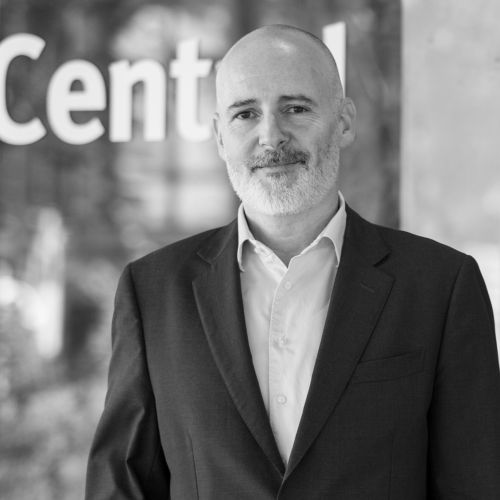Barcelona, collective talent to drive an upturn
- Open data
- Dec 20
- 12 mins
Barcelona is a city that is resilient, open and permeable to change. It has been so in its 2,000-year history, tackling every crisis with innovation, connectivity and growth. It needs to be put back on the map of big cities. And it must do so relying on all social stakeholders, local and foreign, with specific actions that bear a positive impact on the economy, society and the environment.
The pandemic has shaken the world and its consequences have deeply affected the global economy and, in turn, the management of cities. Since the cancellation of the Mobile World Congress in Barcelona was announced at the end of February, the emergency situation in the Catalan capital and its immediate effects on people’s lives have been inevitable. We are facing a health crisis that has been unprecedented in the last hundred years, which has hit the economies of southern Europe particularly harshly.
Against this backdrop, the baseline indicators in Barcelona are currently dire. A drop in gross domestic product in the second quarter of -19.8% year on year, the most severe downturn since records began. For the whole of 2020, the effect of the pandemic could mean, according to the scenarios forecast by the Municipal Data Office, a fall of between -9.5% and -11.4% in GDP. Better figures than those of Catalonia and Spain as a whole, but below those of the European Union. In an optimistic scenario, in 2021 the economy would begin to get moving again, with annual growth of 6.4%. However, these forecasts are subject to a high degree of uncertainty: the progression of economic activity will critically depend on factors such as the degree of containment of the health crisis and the intensity and effectiveness of economic policy measures to maintain jobs and the production framework.
Registered unemployment has risen over the last year, with the figure for August amounting to 23,644 people in Barcelona (35% higher than before COVID-19) and temporary layoffs [ERTOs in Spain constitute a measure that allows companies to suspend employees’ contracts or to reduce their working hours temporarily for economic, technical, organisational, production or force majeure reasons] have contained this figure for the time being. The most powerful sectors of our economy, especially commerce, transport and hospitality, have suffered a sharp drop in activity, in the vicinity of 30%, while industry and services have experienced a fall of just under 20%. And what’s more, about 10% of the business fabric has been destroyed. The weekly newspaper The Economist headlined it as “The 90% economy”. In the best of scenarios, the upturn will come in mid-2021; in the worst-case scenario, the upturn will not be felt until 2023.
Unemployment and temporary layoffs in COVID-19 times
Registered unemployment in 2020 soared across all sectors, especially in services (37%) and for people entering the workforce for the first time (29%). In the third quarter of 2020, 91,282 people were unemployed, not counting the workers who were still affected by temporary layoffs. More than 80% of those unemployed were working in the services sector. Unemployment has risen by almost 20,000 people since February, before the pandemic began, and by more than 23,600 compared to a year ago (September 2019). Unemployment rates rebounded at the beginning of the year, reaching 12.8% in the third quarter. The number of unemployed rose as economic activity recovered following the lockdown and thousands of workers ceased to be protected by temporary layoffs. At the end of October 2020, there were 22,310 companies and 105,860 temporarily laid off in the province of Barcelona (on concluding the magazine edition, only figures up to October were available).
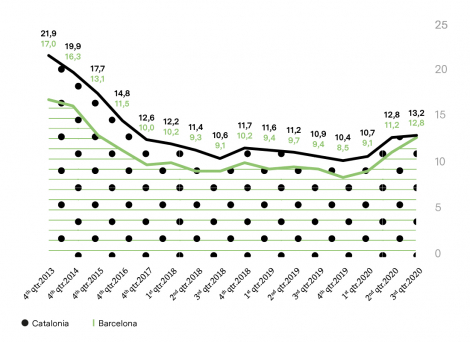
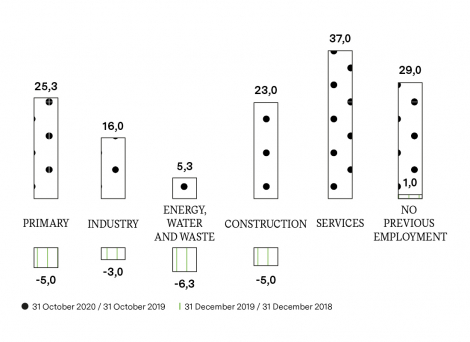
Economic contrasts in the city: disposable income and household material deprivation
Before the COVID-19 crisis, social inequalities and contrasts between neighbourhoods and districts already existed. Although the figures available on income and material deprivation in Barcelona households are prior to the COVID-19 crisis, the following are noteworthy.
In 2017, the income of the richest neighbourhoods was six times higher than that of the poorest neighbourhoods, according to the Municipal Data Office. In terms of poverty, in 2019, 5.9% of households in Barcelona suffered severe material deprivation. This means that 40,000 households could not afford four or more of the following expenses: car, phone, television, washing machine, one-week annual holiday, eating meat, chicken or fish every two days, keeping the house at a proper temperature, meeting unforeseen expenses (of 650 euros) and did not experience delays in making household-related payments.
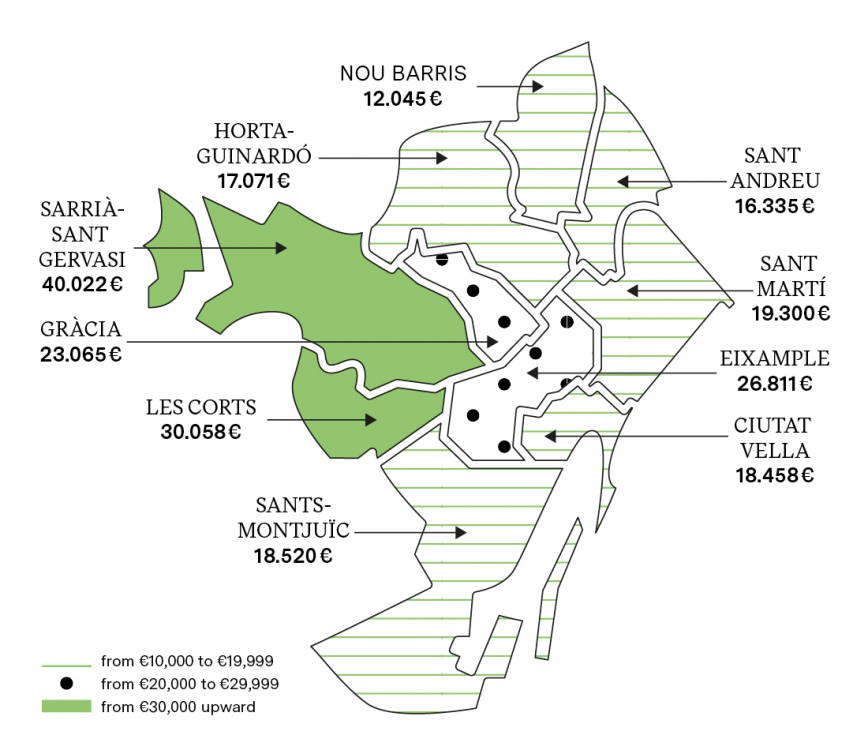 DISPOSABLE FAMILY INCOME PER CAPITA (2017)
DISPOSABLE FAMILY INCOME PER CAPITA (2017)Infographic: Astrid Ortiz
 SEVERE MATERIAL PRIVATION (2019) (% of households suffering therefrom)
SEVERE MATERIAL PRIVATION (2019) (% of households suffering therefrom)Infographic: Astrid Ortiz
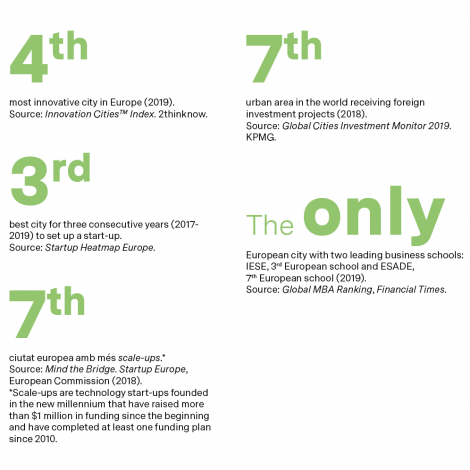 INNOVATION, ENTREPRENEURSHIP AND INVESTMENT
INNOVATION, ENTREPRENEURSHIP AND INVESTMENTInfographic: Astrid Ortiz
We recover certainties
In view of the figures, how should we tackle this scenario? Well by calling on our strengths and values, making need a window of opportunity. In the face of uncertainties, we recover the certainties. Yes, we have experienced other major economic downturns, the most recent one being ten years ago. But Barcelona has always been an example of overcoming, resurrecting the city brand on the strengths of our educational, social and productive ecosystem.
Barcelona possesses attributes that make it highly competitive: it is bright, restless and diverse; it has soul and ambition, and a population density that fosters cohesion. It has stood out for its leadership in various fields. Creativity, in architecture and urban planning, plays an important role in its effervescence and capacity. Moreover, the city is a space in which different agents from the knowledge, business and social world, create, interact and collaborate day after day.
Barcelona has never ceased to be the “City of Prodigies”, as the writer Eduardo Mendoza christened it in his novel, in which he portrays the historic occasion of the 1888 Universal Exposition. The city became known in the 20th century under the industrial momentum, which already marked a major breakthrough in the economic and technological field, and almost tripled its population. Towards the end of the century, the 1992 Olympic milestone marked a dramatic shift towards the city of today, with magnificent times and more turbulent recent ones that have also resulted in uneven growth.
Before COVID-19, and in a sustained manner, Barcelona was placed towards the top of the various global rankings. The 4th most innovative European city and 21st in the world; the 3rd best city to set up a start-up and the 7th city in Europe with the most scale-ups. The only European city with two leading business schools, the 5th most attractive city in the world for talent, especially digital talent, and the 8th in the world for its quality of life, that is, for work-life balance. Along with these figures, which fill us with pride, we cannot forget that in the Besòs neighbourhood a person lives on an income of €520 per month, whereas in the neighbourhood of Les Corts the mean income is €2,500 a month. On average, income in the wealthiest neighbourhoods is six times higher than in the poorest neighbourhoods.
We are a metropolis that must resolve its contradictions and that, in the run-up to 2030 – the goal of the sustainable development agenda –, or 2050 – the deadline for the planet’s decarbonisation–, is currently troubled by a global virus with social and economic ramifications that have not been seen in a century and that must become a turning point to regain self-esteem and rapidly reduce inequalities in the city.
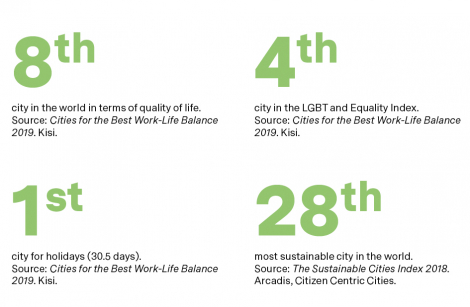 QUALITY OF LIFE AND SUSTAINABILITY
QUALITY OF LIFE AND SUSTAINABILITYInfographic: Astrid Ortiz
Towards a more sustainable model
Putting health and sanitation issues aside, some voices point to the city’s development model as the underlying cause behind the economic downturn that we shall witness, and that we are witnessing. A tourism that has taken over our centre, our beach and our homes. Macro music events or fairs that overuse the capacities of services in the city that reputedly do not yield a tangible and fair return. Or new technology entrepreneurship and start-ups, which are disrupting the business models we know. There is speculation about “backtracking”, turning the situation around, as if most people who get up every day to generate wealth and eke out a living do not also have the right to the city.
We cannot head towards decline and autarky on any account. A new impetus is needed, but learning from the mistakes made. If we do not want to lose one of our best attributes, that of being an open and internationalist city, Barcelona must also be the city of foreigners. Of migrants and tourists. The one that everyone wants to visit, to later pursue, if need be, their life and professional plan there. The city cannot be built in favour of just for a few, but nor can it be constructed against many others.
The key is a strategic vision that aims for a more social, more digital and more sustainable Barcelona. Social because the driving force of the city must be the people and the improvement of the life of each and every one of them, without leaving anyone behind. Digitally capable to guarantee the competitiveness of any economic activity and employment that must assume, and control, the automation of work. And, finally, sustainable, because to the environmental vision, we must add, the aspiration to transform the economy, environmentally-driven and fair growth with all the links in the value chain, as a guarantee of sustainability and continuity.
Therefore, the city must generate the conditions to create companies and cooperatives, to attract professionals and headquarters of international companies and institutions, and to consolidate their decision-making centres in the city. Because it is only in this way, growing but knowing that the effects must bear a positive effect on everyone, will we achieve the dream city.
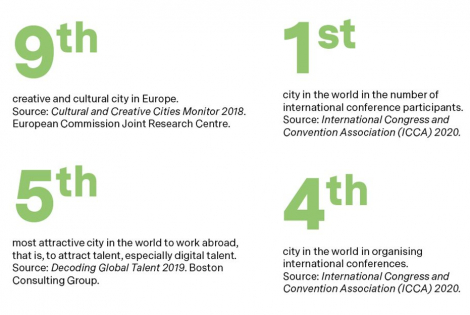 LOCAL AND FOREIGN TALENT
LOCAL AND FOREIGN TALENTInfographic: Astrid Ortiz
How to get there?
We know where we want to go. But are we clear on how to get there? Ten, twenty or thirty years from now, when we look back, we will want to have indicators that reconfirm our aspirations. And the figures will be indicative of many things. If we have accompanied companies and businesses in the ecological transition; if we have empowered people for a more digital, personal and professional world; if we have facilitated innovation or economic activity or, conversely, if the rigidity and complexity of doing things in the city have pushed away the vitality and necessary transgression driving change.
And if we succeed, what we have done will have been the product of collaboration, courage and solidarity. Of the drive of the City Council and civil society to recover the economic and life-giving momentum of the city. Of the fluidity and the freedom to make decisions with hardly any hastiness, but being clear about the desired effects. Because Barcelona is a committed and empowering city that wants to offer opportunities to young people, who trust in the leadership of women and in the experience of the elderly. It must involve large companies in the development of the city and help local socio-economic and unifying projects.
Like any creative and global city, Barcelona is the sum of many initiatives and trajectories. The sum of intelligence and skills. The sum of talents. And it is through relying on stakeholders from the production and social system, as collaborators in developing and implementing public policies and actions, that the city is transformed and gains its competitive advantage. If in the last industrial revolution success depended on capital, now it is the people who make the difference in our economy.
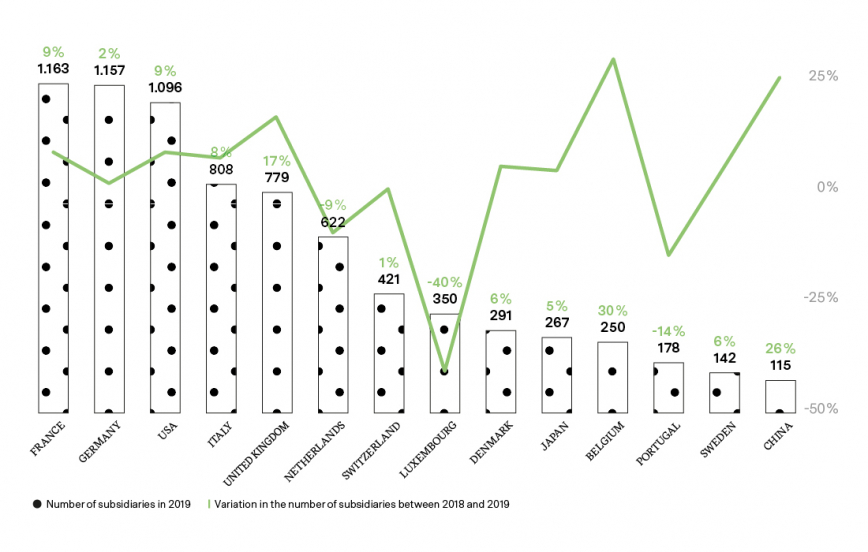 FOREIGN COMPANIES IN CATALONIA (2019) AND VARIATION IN THE NUMBER OF SUBSIDIARIES BETWEEN 2018 AND 2019
FOREIGN COMPANIES IN CATALONIA (2019) AND VARIATION IN THE NUMBER OF SUBSIDIARIES BETWEEN 2018 AND 2019Infographic: Astrid Ortiz
The significance of international events
Barcelona attracts thousands of visitors, a number that has plummeted since the COVID-19 crisis. Some major events have been redesigned in virtual format this year. Annual events such as Expat Day, Barcelona Design Week, The Mobile World Congress and Sònar+D already offered part of their programmes online in pre-2020 editions.
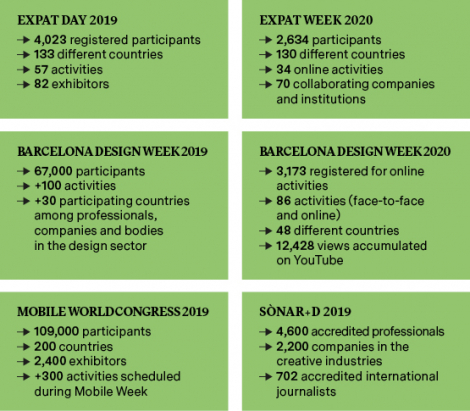
It’s time to prove it. Because a city with a vocation to be a capital like Barcelona aspires to be, must welcome foreign talent and harness local talent. We must be permeable to change, shed the fear of what we cannot control and commit to building what we can define together. Therefore, the new economic agenda of a city that wants to be competitive, equitable and sustainable must commit to collaborative talent. And our major challenge will be to encourage and retain it.
We will get the economy moving again, overcome the pandemic and, on the way, reposition the city to meet the standards it has always adhered to, those of reinvention and modernity. But this time, in return, we not only want to compete with other cities, but to surpass ourselves.
Just over a year ago, the city defined itself with a new story bearing the emblem of Always Barcelona. By then, a polyphony of voices that make up the diverse Barcelona projected to the world was already being collected, the same idea that reflected “the city of prodigies” was being pointed out and going further: the city of life plans. Professional development cannot be detached from life plans, linked to city values. This is and will be Barcelona: the city of big transformative and life plans.
How to revive the economy in times of COVID-19
Barcelona Activa launched actions to support self-employed professionals and companies during 2020. These and up to 60 measures have been executed by the Economic Response Coordination Centre (Cecore), a body set up at the beginning of the COVID-19 pandemic.
BCredits. Microcredits of 12,500 euros for projects endorsed by Barcelona City Council with the Catalan Finance Institute and the Catalan Mutual Guarantee Society.
Impulsem el que fas. Grants of up to 80% for projects that get the neighbourhood economy moving.
Barcelona accelera. Investment of 10 million euros in six private capital venture funds to boost innovative start-ups in the city.
Rethinking. Programme that offers training and advice to 529 companies and self-employed people.
Crea Feina Barcelona. Financial allocation to companies to facilitate the hiring of personnel.
The grants have carefully considered small businesses’ need for digitisation. Almost 290,000 euros of direct rental aid have also been awarded, more than 115,000 euros have been granted for the digitisation and digital transformation of businesses and in the field of the social and solidarity-based economy, they have increased loans for grants by 37.5%, which reach 131 projects, and lines of credit are promoted with agreements with ethical finance worth 4 million euros.
Barcelona Activa has increased the technological and technical-professional training available to self-employed people, has created a COVID-19 emergency job pool and made labour rights advocacy available to them.
The newsletter
Subscribe to our newsletter to keep up to date with Barcelona Metròpolis' new developments



